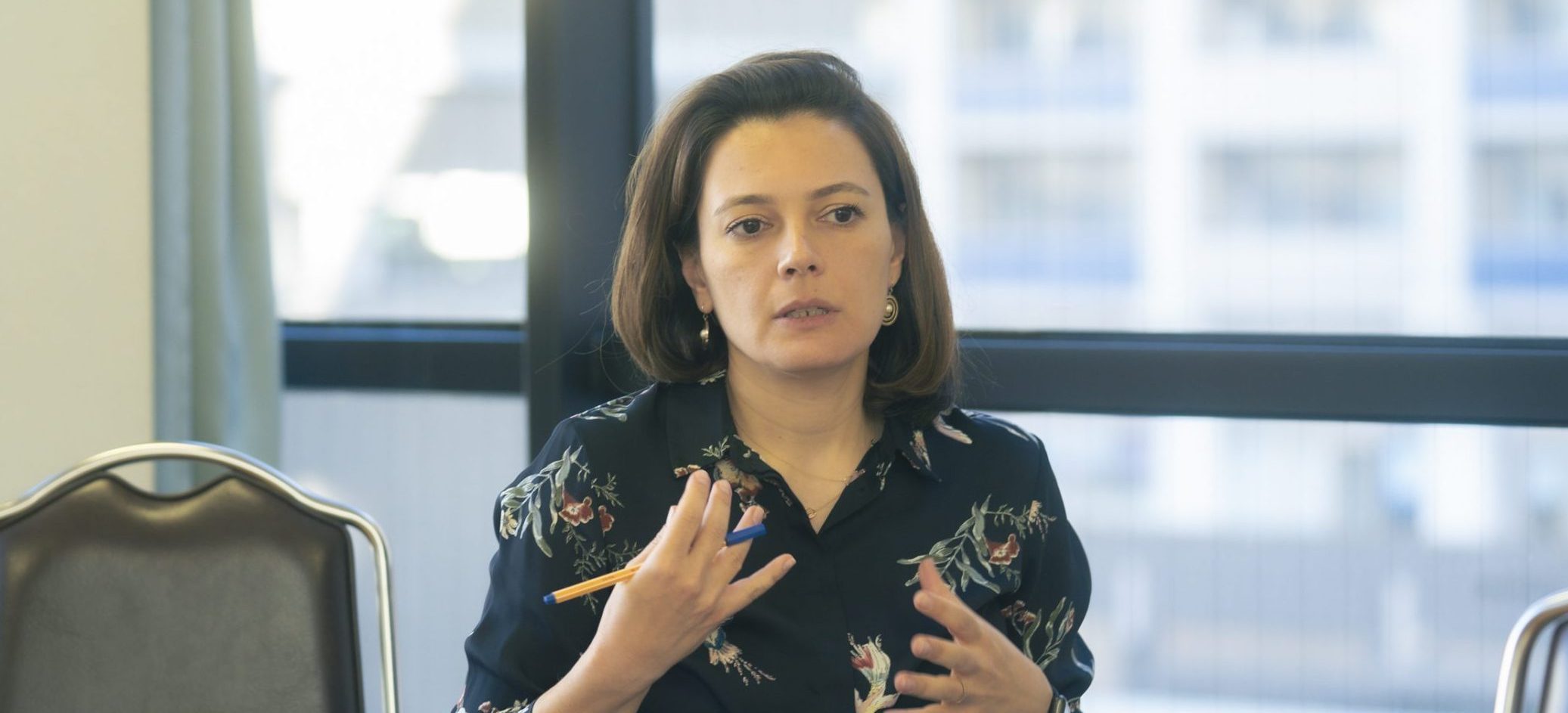
Handan Uzal Dündar
The Challenge of Maintaining the Status Quo: The Performing Arts Scene in Turkey Today and the Istanbul Theatre Festival
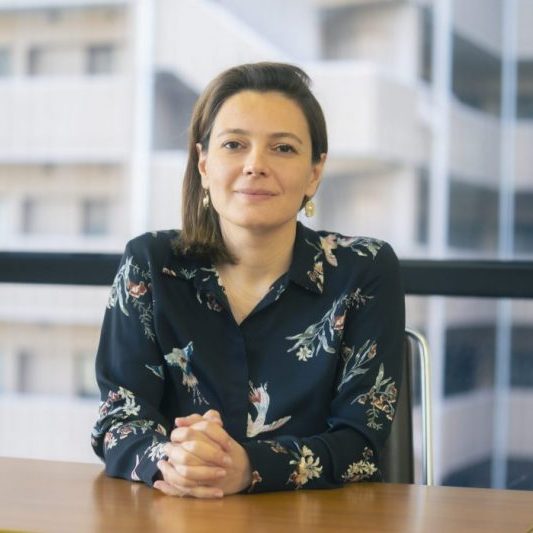
Photo: Leo Yamamoto
Handan Uzal Dündar
Programming & Operations Manager of the Istanbul Theatre Festival
Born in Turkey in 1984. Handan Uzal Dündar graduated from the Ege University, Department of Radio, TV & Cinema of the Communication Faculty in 2006. Upon graduation, she lived in France to further her language skills.
She joined the Istanbul Foundation for Culture and Arts (İKSV) in 2010 and after gaining professional experience in different departments of the foundation for a year, she became a permanent member of the Istanbul Theatre Festival in 2011. Since then, she has been in the team organising the most prestigious and biggest scale performing arts event in Turkey.
As of 2022, Handan Uzal is the Manager of the Istanbul Theatre Festival, responsible for both programming and operations, working alongside a curator that changes every two years. She is also responsible for the Gülriz Sururi – Engin Cezzar Theatre Encouragement Award, granted annually by the İKSV.(Updated June 2024)
Istanbul Theatre Festival:https://tiyatro.iksv.org/en
The Istanbul Theatre Festival is an international theater festival operated by a nonprofit organization, the Istanbul Foundation for Culture and Arts. In 1973, on the fiftieth anniversary of the republic, the Istanbul Festival was started as an international cultural event. It later split into separate events and from this emerged the Istanbul Theatre Festival in 1989. The Istanbul Theatre Festival is currently held every autumn, showcasing a range of theater and dance from Turkey and around the world. Handan Uzal Dündar is in charge of the festival’s programming and operations. She spoke about the performing arts scene in Turkey, exchanges with Europe and other countries, and the present state of the festival.
Interview/text: Rieko Suzuki
English translation: Claire Tanaka
- Before touching on the Istanbul Theatre Festival, can you talk about the theater scene in Turkey right now?
- Plays in Turkey are mostly text-centric, but at the start of the 2000s an alternative theater trend arose. Nowadays, you can’t really call it “alternative” but that trend brought us to the independent theater movement we have today. For the past five or six years, there has been economic hardship and several years before the pandemic hit, we began to see monologue shows that don’t use any props. For a solitary actor to carry an entire play, an entire stage, is no easy task, but this trend has led to the cultivation of a lot of young actors who can handle such a feat. At the same time, our playwrights have also begun writing one-man plays at a very high level. So in recent years, the quality of our actors and plays has been clearly going up.
Meanwhile, a large, privately run performing arts center was built in Istanbul in 2013 and it was the first time we had a space for staging musicals and other large-scale shows that require a lot of financial investment. People can see famous actors who ordinarily appear on television, and audiences are prepared to pay whatever it costs to see such a show. Tickets are often sold out. They are spending money not just on the actors but on the sets, lighting, sound, and more, resulting in high-quality stage productions.
The state of performing arts in Turkey is such that we have to find a balance between these two trends. On the one hand there are large productions featuring famous actors, while on the other hand people putting on independent plays are pursuing quality yet can’t even find a place to rehearse or a venue to perform, and it’s hard to draw an audience. This dichotomy is also affecting the behavior of audiences, so I don’t think it is a good situation. Not only that, but rising prices and the weak lira has also had an impact, and theatergoers who would normally go to see five or six works in a season are now stopping at just two or three.
Mind you, what I have just described is limited to the privately-operated side of things, and limited to Istanbul. Anatolia and other regions have very few independent theater companies. There are theater companies connected with state and municipal theaters, but anyplace that has both is going to be a major city.
-
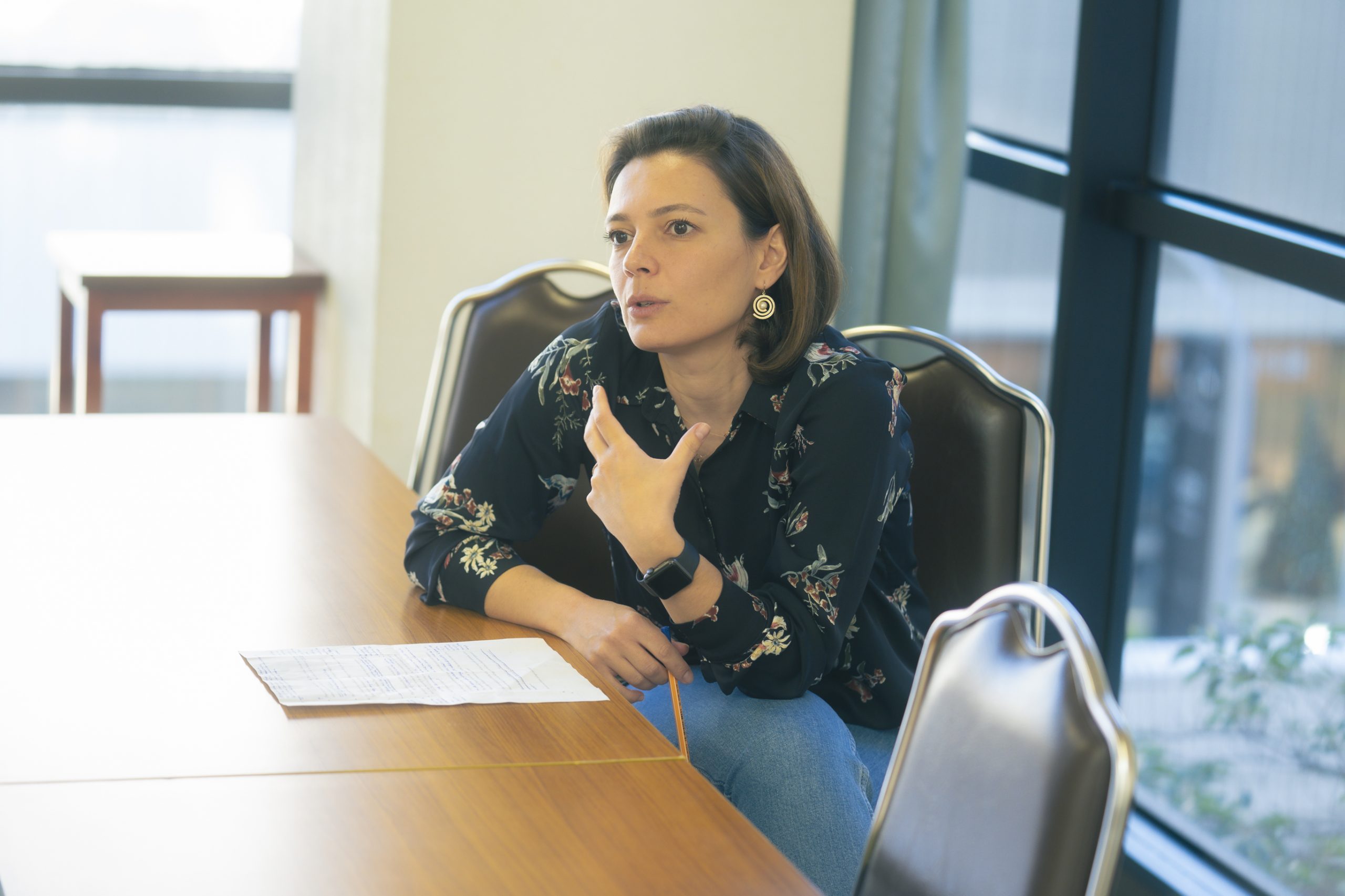
Photo: Leo Yamamoto
- What sort of works are staged at state and municipal theaters?
- There are state theaters in each region, they each have affiliated theater companies, and the actors are like civil servants who get paid a salary. There are also theater venues and companies run by regional municipalities, and they provide programming at affordable prices for a range of audiences. This mission to reach every demographic in society is something I also agree with, naturally, and I think it’s something that should be promoted. On the other hand, it raises the issue of how to think about the diversity of the works. It’s true that there is content easy for everyone to understand while also having aesthetic insight. But that is easily affected by the personalities of the theater, company, and director, so it is hard to provide on a consistent basis.
- Could you give an example of the sort of work that is accessible to people of every demographic?
- There are classic and contemporary works. Everyone likes to watch Shakespeare. But at the Istanbul Metropolitan Municipality City Theatre there was a long-running show by a Turkish playwright that played for decades until recently. People feel comfortable watching Turkish works, but at the same time everyone watches Chekhov and Tolstoy, so they are also in demand.
- How about dance?
- There is a ballet company at the state opera house, and some people who studied there have formed a group called Modern Dance Theatre. There are also independent dancers and dance companies, though few in number. But just like the independent theater companies, they struggle to secure rehearsal and performance space, and it is hard to build an audience. Despite conditions under the pandemic making international networking extremely difficult, Mustafa Kaplan and Filiz Sızanlı continue to pursue fruitful careers. (https://taldans.com/)
- What sort of people are making theater and working internationally?
- An excellent director whose name I must mention is Sahika Tekand. Through her friendship with Theodoros Terzopoulos from Greece, she was connected with Japan’s Tadashi Suzuki. The works directed by Murat Daltaban were chosen for the main program of the Edinburgh Festival. There is also Yeşim Özsoy Gülan, who has led her own theater company for twenty years and is active worldwide as a director.
The people I just named, including dance leaders, all have something in common. They are not just creating for local audiences. Internationalism is not my only criterion for evaluation, but they all have something they can use to appeal to audiences from different backgrounds, and I think the way they work at that is something important. I think myself and others running international festivals value that sort of thing, and we need to create opportunities for directors with this potential to go international.
- How do you think the Turkish performing arts are received around the world?
- There is a tendency for political works to get a lot of attention overseas. But as a festival, our ideal is to convey a more aesthetic aspect, a high aesthetic level. To achieve this, we often hold showcases. Naturally, artists are not the only ones who can exert influence on these issues, but if we don’t make these opportunities, the entrenched tendencies will get even stronger. I’m trying to say I think it’s more important for this to be an exchange of art.
-
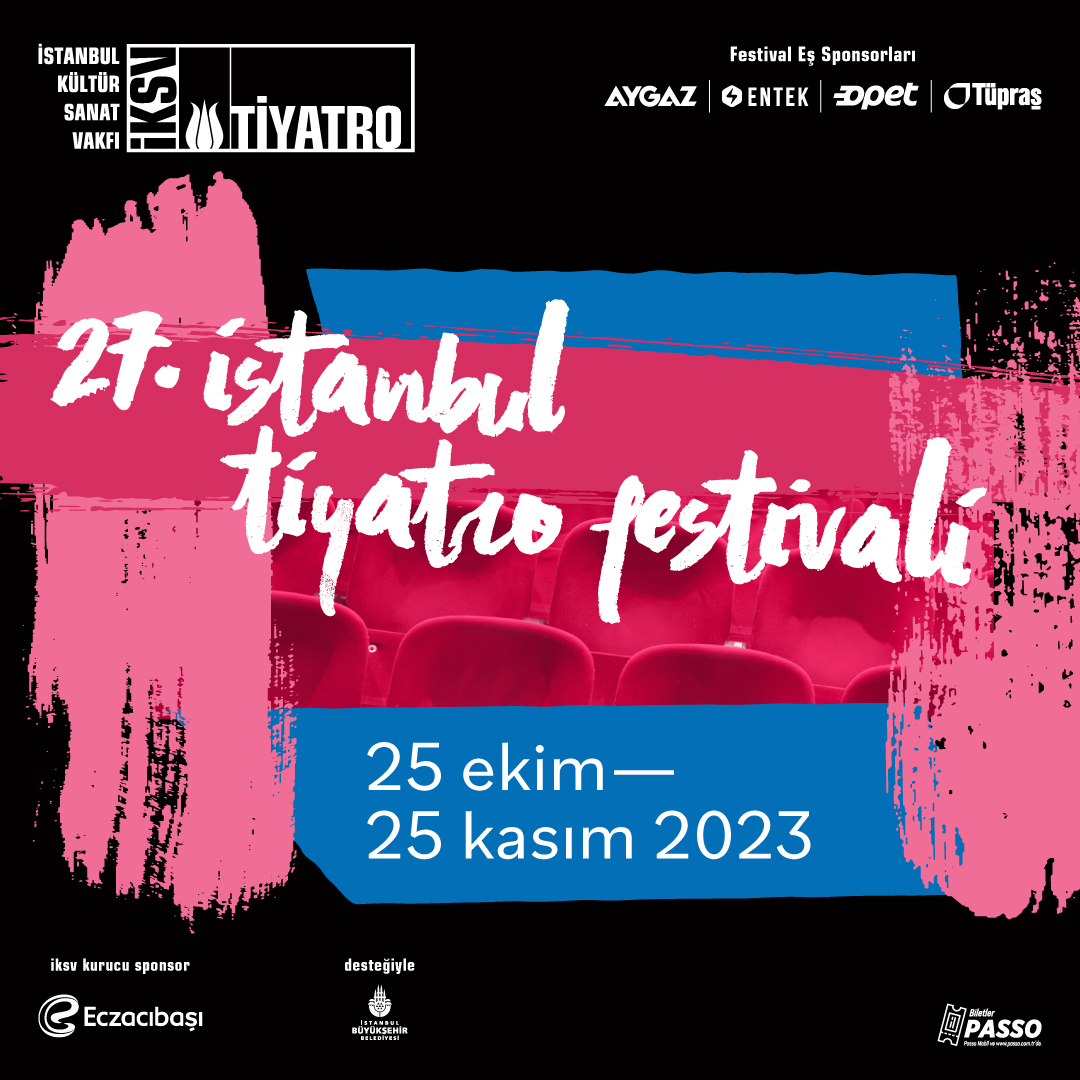
Poster from the 27th Istanbul Theatre Festival held October 25 to November 25, 2023
- Based on this sketch you have painted of the performing arts situation in Turkey, please outline the position and role the Istanbul Theatre Festival has within this.
- The Istanbul Theatre Festival is Turkey’s largest international theater festival. Due to the impacts of the economic crisis and the pandemic, festival we are struggling but of course Istanbul Theatre Festival is considered one of the preeminent theater festivals in the world. This is thanks to my predecessors who built the festival, especially the second festival director, Dikmen Gürün, who ran the festival for twenty years until 1993, showcased many internationally acclaimed artists and works, and put a lot of effort into nurturing artists domestically.
Our mission is to foster theater-makers and audiences and raise the level of both. In order to do so, we must provide works with internationally recognized value to audiences in Istanbul. Local artists often told us, “We were putting on shows in a place where Robert Wilson was doing shows just down the street. That really motivated us.” These works bring inspiration to both local artists and audiences.
Naturally, in addition to this, we support Turkish theater companies and artists, and it is our mission to make the Istanbul Theatre Festival an event that delivers world premieres.
-
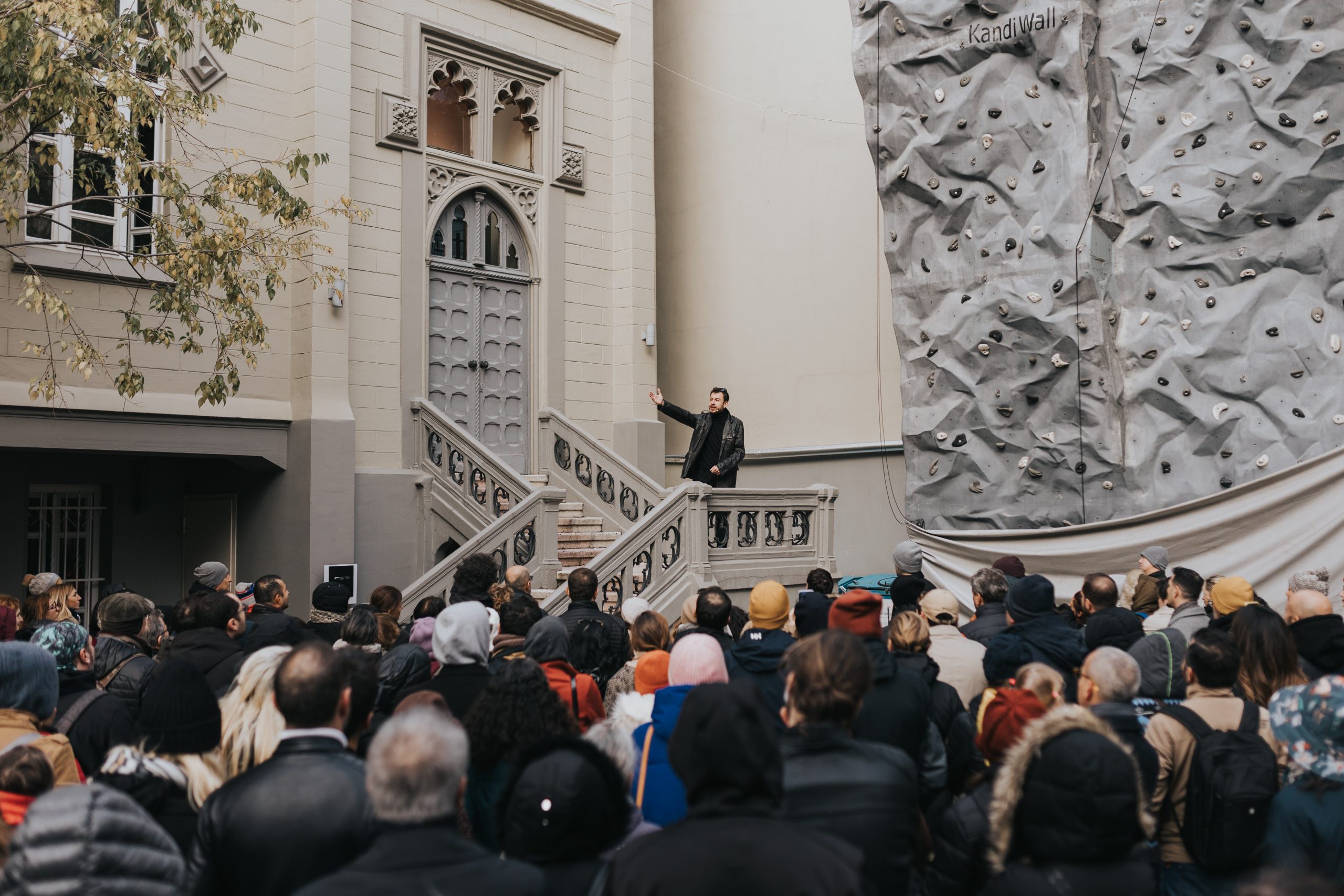
Istanbul Mon Amour staged at the 2023 Istanbul Theatre Festival. Photo: Salih Üstündağ
İSTANBUL MON AMOUR | BEYOĞLU
- Since 2021, the programming at the Istanbul Theatre Festival has been selected by curators on two-year assignments rather than by the festival director. The first two years have just finished, so how do you feel about the new system?
- The aim of the curator system is to implement new perspectives and new ways of thinking every two years, to sustain and heighten the interest of audiences. However, the first year was very difficult. In the case of Turkey, the idea of a curator is widespread in the field of visual arts, but for the fields of dance and theater, we had to begin from square one, communicating and sharing the concept. The curator also had to start from scratch, learning about the structure of the foundation and origins of the festival. So just getting to know one another took a long time. Plus, it was at the height of the pandemic and new COVID variants kept popping up, making it hard to schedule companies from overseas. we were only allowed to use half the seats in theaters, making it hard to expect large audiences. It was very chaotic on-site. When I look back now, I can’t even remember how we got through it. [laughs]
I’m the programming and operations manager, but in the second year I feel like I finally began to see the relationship between the festival team and the curator. That is to say, we festival staff are responsible for connecting the perspective of the curator with the needs of the audience that the theater festival has cultivated. The curator for the past two years has been Işıl Kasapoğlu, who graduated from the Sorbonne and did theater in France for many years before returning to Turkey, where he now works with his theater company, Semaver Kumpanya. He is a text-based theater director, but he’s also very interested in mask plays, so he collected materials from around the world and we watched them together, and we were able to showcase the work of the German Familie Flöz. We also showed Tanztheater Wuppertal’s Café Müller but that was not so much the curator’s intention as it was a decision based on the twenty-year relationship the Istanbul audience had with the works of Pina Bausch. As I’m sure you know, international invitations and co-productions are not a matter of talking about it today and starting tomorrow. It took several years before the possibilities finally came into view, and when that time came it was my job to think, do I match with the curator’s approach at that time? Or do I determine under what context it can be shown?
- Turkey is known as the bridge between Europe and Asia. What are your thoughts on these geographical and cultural conditions?
- It’s true that Turkey and especially Istanbul is a region that serves as the bridge between Europe and Asia. But not enough Turkish theater people are taking advantage of this geographical position that allows them to look to both Europe and Asia. In fact, I feel like cultural exchange is at a standstill. We need to enhance support to resolve this problem. Our festival alone is not enough. It is economically difficult to continuously pursue creative activities. This is a problem all over the world, in that only people who receive financial support are able to do it, but I think it is even more difficult in Turkey. We can’t just leave it up to the artists. Other people have to fight for them, too. Turkey needs an official organization like the Japan Foundation.
- Lastly, as a festival with over thirty years of history, what are your goals for the future?
- For the first two years of our curation system was accomplished successfully, The quality of work goes without saying, and I feel like we were able to bring audiences up a level as well. So now the issue is, how to maintain this situation. The world continues to transform in complex ways, and Turkey itself is an extremely dynamic country. Within those conditions, simply maintaining it will be a challenge.
-
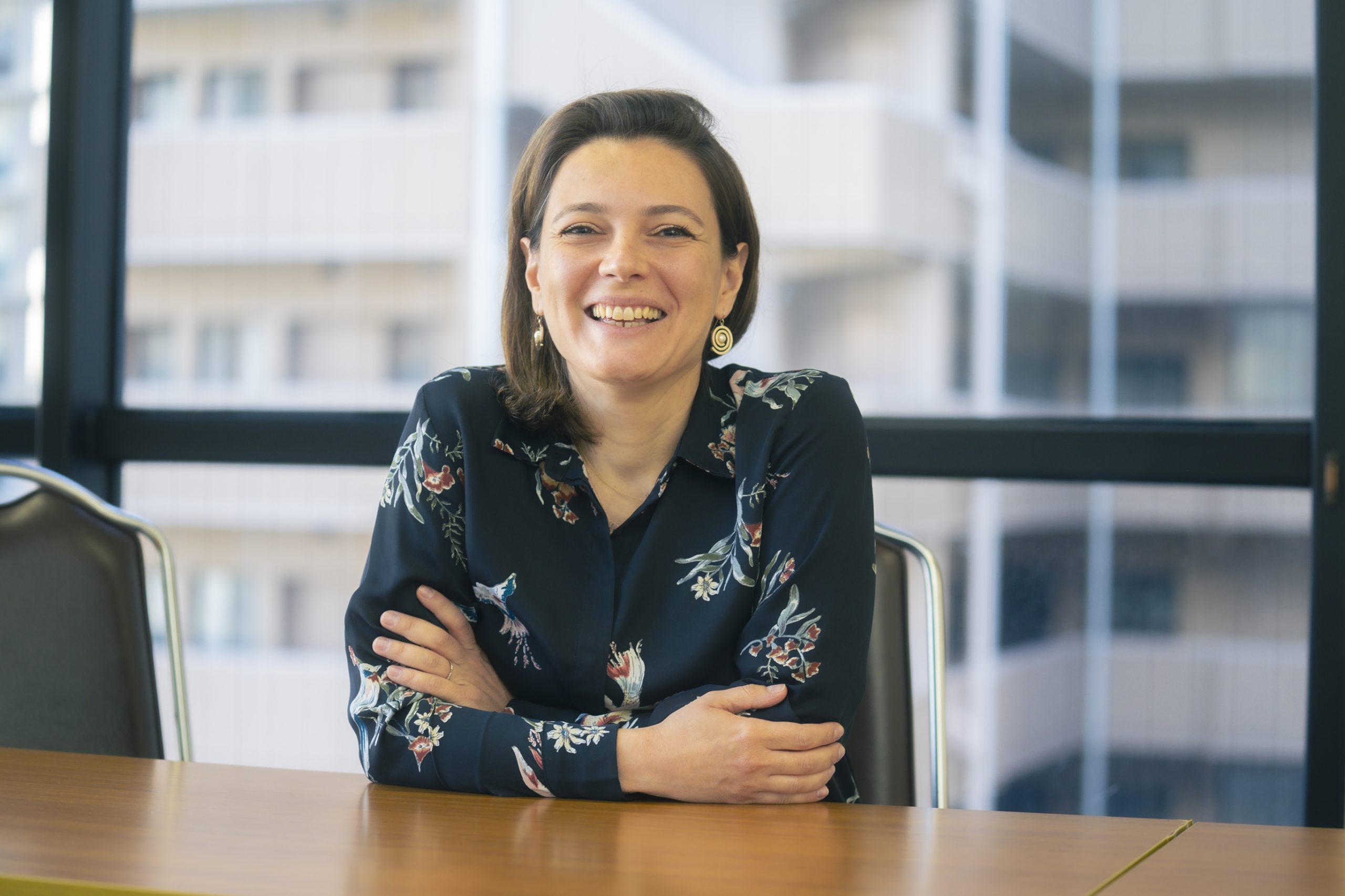
Photo: Leo Yamamoto
Interpretation: Inan Oner
Related Tags

